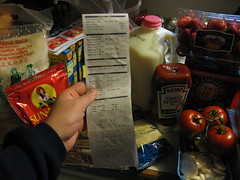A few weeks ago, we discussed the importance of making a grocery list. Going one step further, planning the week’s meals speeds up grocery shopping and reduces household food waste.
Meal planning forces you to have a purpose for each purchased item (with one or two fun exceptions). Deciding on meals can be a chore, but no more so than if it weren’t planned. And if you don’t cook one of the planned meals because plans change–as they always do–just push the schedule back a night. I find that a notecard or these charts are useful. You paper-phobic folks can use this planning site or download Meal Planning 3.1.
 As the food shopper of the house (surprise, surprise), I used to shop with the loose goal of having “enough” in the house to make the week’s dinners. Aiming for that subjective feeling of plenty and the supermarket guesswork often led to overstocked shelves and way too much time in the supermarket. Plus,
As the food shopper of the house (surprise, surprise), I used to shop with the loose goal of having “enough” in the house to make the week’s dinners. Aiming for that subjective feeling of plenty and the supermarket guesswork often led to overstocked shelves and way too much time in the supermarket. Plus,
We’ve seen this in action with the story of “My Sweet Potato.” As I mentioned in that post, I bought the potato just to have it on hand to use for ‘a dinner.’ Since that dinner wasn’t specified, its main use was as a mold-growing venue.
Meal planning and the idea of not having a “stocked” cupboard or fridge takes some getting used to. But, if you’ve got all your meals and snacks planned, what’s the worry? If you’re like us, I’m sure you have plenty of old “staple” items lying around for when that storm hits. You know, the cans of things you’ve elected not to eat.
One Comment